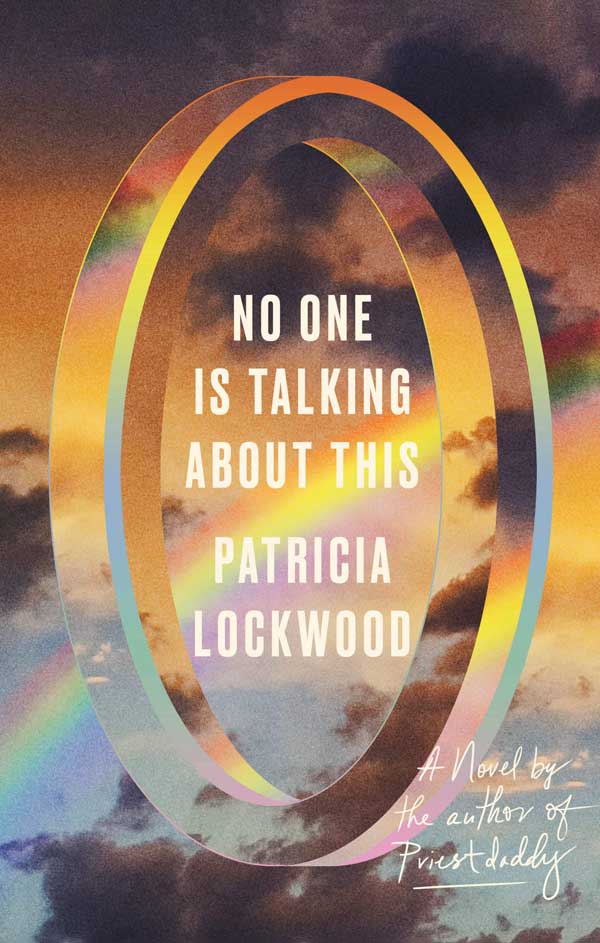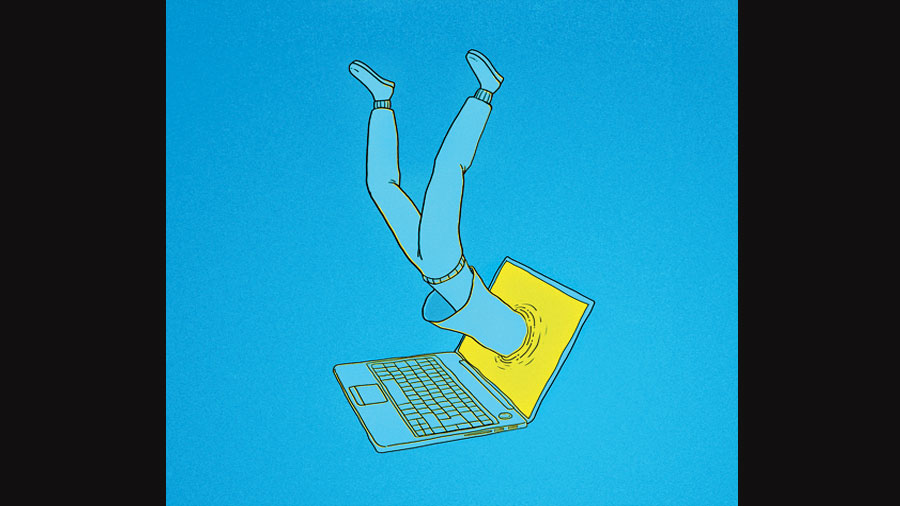Book: No One is Talking About This
Author: Patricia Lockwood
Publisher: Riverhead
Price: $25
Are you okay, America? Because I’m getting a really weird SOS vibe these days. Or, at any rate, that’s what I thought as I soldiered through the first fifty pages of this book, which was like walking over a glittering, jagged carpet of broken memes, edgelord comments, promoted content and glitchy GIFs. However, I gritted my teeth and persisted and, in time, spaces began to open in the mind-numbing kaleidoscope of internetty things with which Patricia Lockwood has filled her shop windows. The jagged glitter became a lacework through which something entirely different began to peep through.
This story is ostensibly about an unnamed female narrator, married, does something unspecified on ‘the portal’, possibly content writing or influencer stuff, has a weird thing for chihuahuas in disturbing contexts and a semi-dysfunctional set of kooky relatives. So far, seems like a thinly-disguised Portrait of the Author. Patricia Lockwood is something of a social media phenomenon and, at first, I thought, ‘oh god no, novelized Twitter for 100+ pages, arrrgh’. But I was wrong.
Patricia Lockwood has been through the internet-whale and come out the other side, but she doesn’t have the wide eyes and the tendency to harangue the demons on your shoulder that survivors of internet-addiction seem to acquire along the way. As I read on, I realized this slo-mo explosion of a book is the only way she could sneak up on her target audience and sandbag them with her message. Because she truly is reporting from a war front.
What does one not talk about in Western society? One does not talk about the thing that got people burned at the stake for more than seven centuries: spirituality. To be spiritual in the West is to be a cultist, a drinker of Kool-Aid, a pixie-loving, chakra-spinning freak. Because as we all know, none of that is real, right? You are born, you only live once, you fear missing out, then you grow old, no one loves you, you die and relieve the economy of your unproductive burden. Or you spend millions prolonging your material existence. That’s basically it. If time does not pass, there’s always TV. And now the internet.

No One is Talking About This by Patricia Lockwood, Riverhead, $25 Amazon
Ah, but if only the world would follow the dictates of Enlightenment philosophers! ‘I scroll, therefore I am’ loses its lustre when real life shows up, knocks the phone from your hands and says, ‘Look at me! Pay attention! This is real! I’m important!’ Important isn’t the same as fun. Important is deep, difficult, expensive in the currency of pain and it changes you. Then you realize with chagrin that the ability to sit in a huddle all day, peering at a tiny window into a fantasy world of shadows, is a privilege the universe gave you only by accident. You were trying to become small enough to fit down that rabbit hole, but someone even smaller came along, interrupted you and said, ‘If you don’t look at me now, I’ll be gone forever.’
To tell you more, to explain the nature of this divine interruption, would be to spoil the book for you. All I shall say is the author is very gently explaining that the reason no one talks about this is because it can’t be talked about. It is beyond words: it’s the primacy of experience, the ineffability of feeling things as they happen, in the here and now, in what the Sahajiya-Marfati tradition calls ‘bartaman’. When you are in bartaman, all of you is concentrated in you-here-and-now. There is no escape, because you don’t want to be anywhere else. For good or bad, for pain or gain, you want to know that moment completely. And that is the essence of spiritualism. It has nothing to do with gods or auras or neti-pots. You don’t have to believe in reincarnation or connect with angels or glimpse the light beyond the darkness of death. You just have to be.
Much of the brain-fog that is preventing us from halting climate despair, changing our justice systems, or protecting and nurturing children is down to our inability to be located in bartaman. The opposite of bartaman is ‘anuman’, which translates loosely as ‘guesswork’. Anuman is when you surmise things that don’t exist now, but may have existed or could exist. Anuman pulls you out of the here-and-now and tosses you into the there-and-when. The moment your feet leave the ground, you lose the capability of seeing yourself clearly, so you can’t act, can’t walk without falling over, can’t save yourself from grief. That’s the situation our protagonist starts in. The incident that pulls her out comes as a bolt from the blue on a personal level, but Lockwood is also at pains to show us, very subtly, how the political fractures of her day have led to this one family’s transformative experience. In that sense, this is a political book, but to reduce it to that would short-change its art. As for the rest, I leave you to discover it for yourself.











